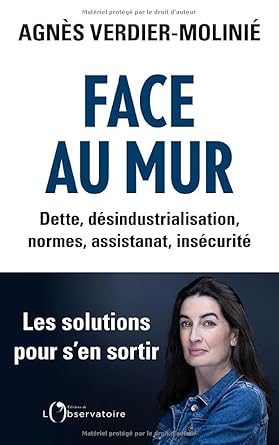This well-documented book deals with a highly topical issue for the current economic situation in France. Indeed, it offers many quantified solutions to overcome 5 problematic issues: the walls of debt, deindustrialization, standards, welfare, and insecurity.
After a diagnosis of the level of France’s deficit, Ms. Verdier-Molinié immediately confronts us with the significant risks of a drift in the deficit and therefore of the debt, which already exceeds 3,300 billion euros. The discrediting of France for the non-control of its deficit could harm its ability to finance this debt and could even lead to the takeover of public finances by the International Monetary Fund as happened in Greece.
To find a positive trajectory and save 110 billion euros by 2029, Ms. Verdier Molinié shares a dozen extremely concrete solutions on each of the 5 themes mentioned above.
To reduce the debt, immediate common sense measures are centered around the reduction of public spending through their increased efficiency as well as the elimination of duplicates. A reform of unemployment insurance, as well as a new reform of pensions and the health system, are clearly described as priorities.
To get out of the deindustrialization that has largely begun, we find a recommendation strongly pushed by companies in recent years on the reduction of production taxes, which weigh nearly 20 billion euros per year, to improve competitiveness, as well as to take advantage of the significant benefit through abundant and cheap electrical and nuclear energy. She also proposes to severely limit environmental standards, which is obviously less of a consensus in the current context of CSR.
Ms. Verdier Molinié also draws up a damning assessment of the Standards often resulting from entry into Europe, which constitute a very significant competitive disadvantage compared to some of our American or Chinese competitors in particular. She proposes to make a diagnosis of the administrative burden on companies, knowing that the already existing indices show a doubling of these standards for companies in recent years, and particularly heavy for SMEs. The recommended solutions are quite classic in style: a standard created, a standard deleted, but also to constitute indices for monitoring normative complexity.
The subject of the Assistantship, known to all but rarely quantified, is the subject of an interesting analysis (number of hours actually worked, number of strike days, facial gratuity because there is always a payer behind, consumer or taxpayer). She also insists on the rehabilitation of the value of Work (training to be carried out) and takes a firm position on immigration, which can only be granted in exchange for work.
The subject of Insecurity is also documented because Ms. Verdier Molinié, rather expected on the economic subject, makes an assessment of its impact. She tries to quantify the cost of riots and the recidivism of offenders, for example. The proposals she makes range from the effective execution of sentences to the construction of prisons and also, in general, to the cessation of social rights for offenders.
This book contains many proposals, sometimes consensual, sometimes less so, with a priority given to the economy and therefore to the treatment of the debt wall and public finances. She believes that political and non-ecological measures are necessary to get out of the current situation by 2029.
But often in France, it is not because we have a clear vision of the measures to be taken that the human and political context are now united to put them in place. But this book can be a “building block” for the construction of the future.
Agnès VERDIER-MOLINIE is Director of the IFRAP Foundation, a THINK Tank that evaluates public policies.
Olivier STEPHAN


